Organizational Behaviour Report: Influence on Individual and Teams
VerifiedAdded on 2023/01/13
|13
|3269
|91
Report
AI Summary
This report provides a comprehensive analysis of organizational behaviour, focusing on the interplay of culture, politics, and power within a business context. It begins with an introduction to organizational behaviour, emphasizing its importance in understanding human actions within a company, using Harrods as a case study. The report examines the influence of organizational culture, including role, person, task, and power cultures, and their impact on individual and team behaviour, with a focus on the role of HRM. The report explores organizational power, specifically the French and Raven power model (legitimate, expert, coercive, and reward power), and its effects on employees. It then delves into motivation theories, covering both content theories (Herzberg's Two-Factor Theory and Maslow's Hierarchy of Needs) and their practical application. The report also considers team effectiveness, the factors that contribute to it, and the theories used to solve organizational problems. The report draws conclusions and provides references to support the analysis, offering valuable insights into the dynamics of organizational behaviour and its impact on business success.
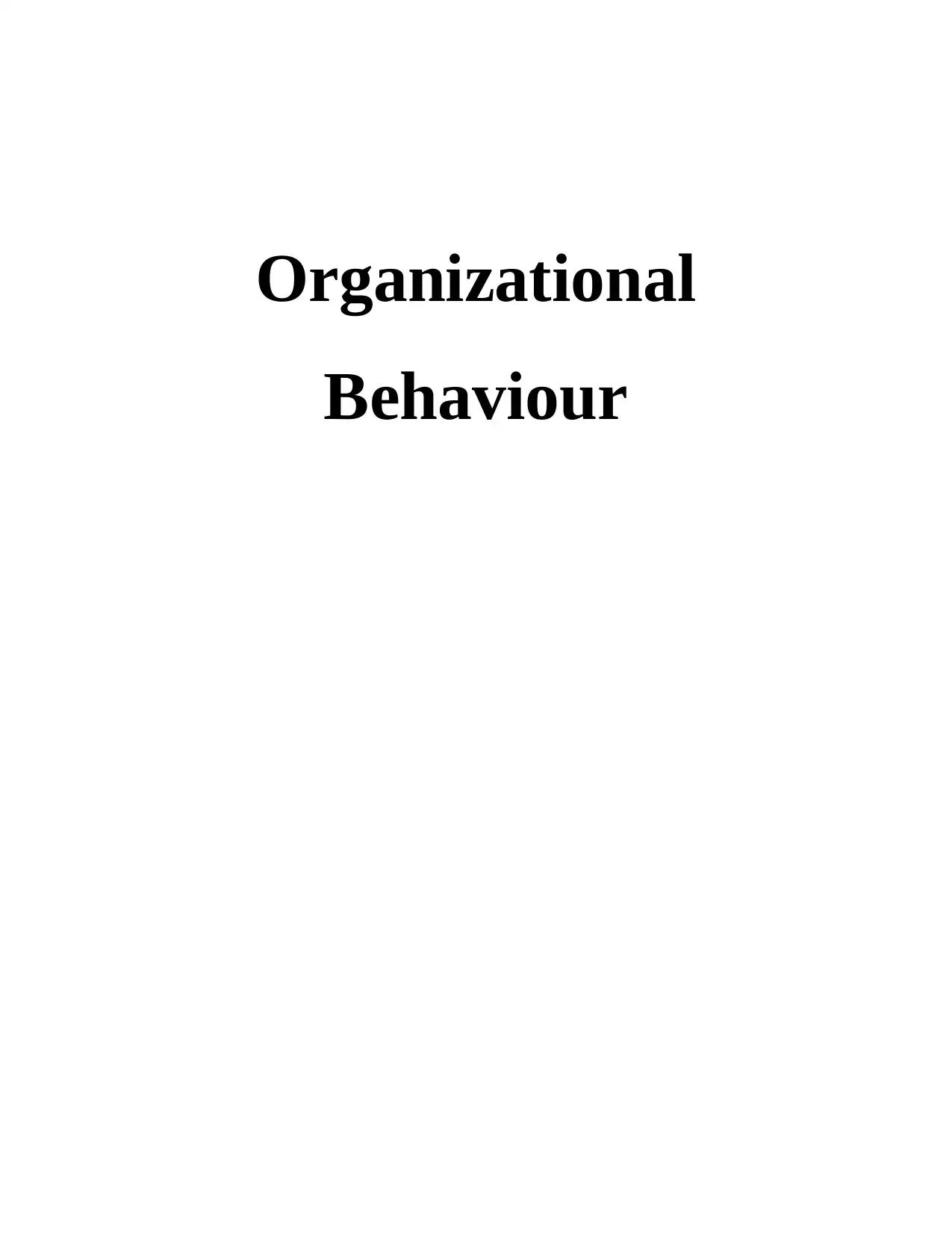
Organizational
Behaviour
Behaviour
Paraphrase This Document
Need a fresh take? Get an instant paraphrase of this document with our AI Paraphraser
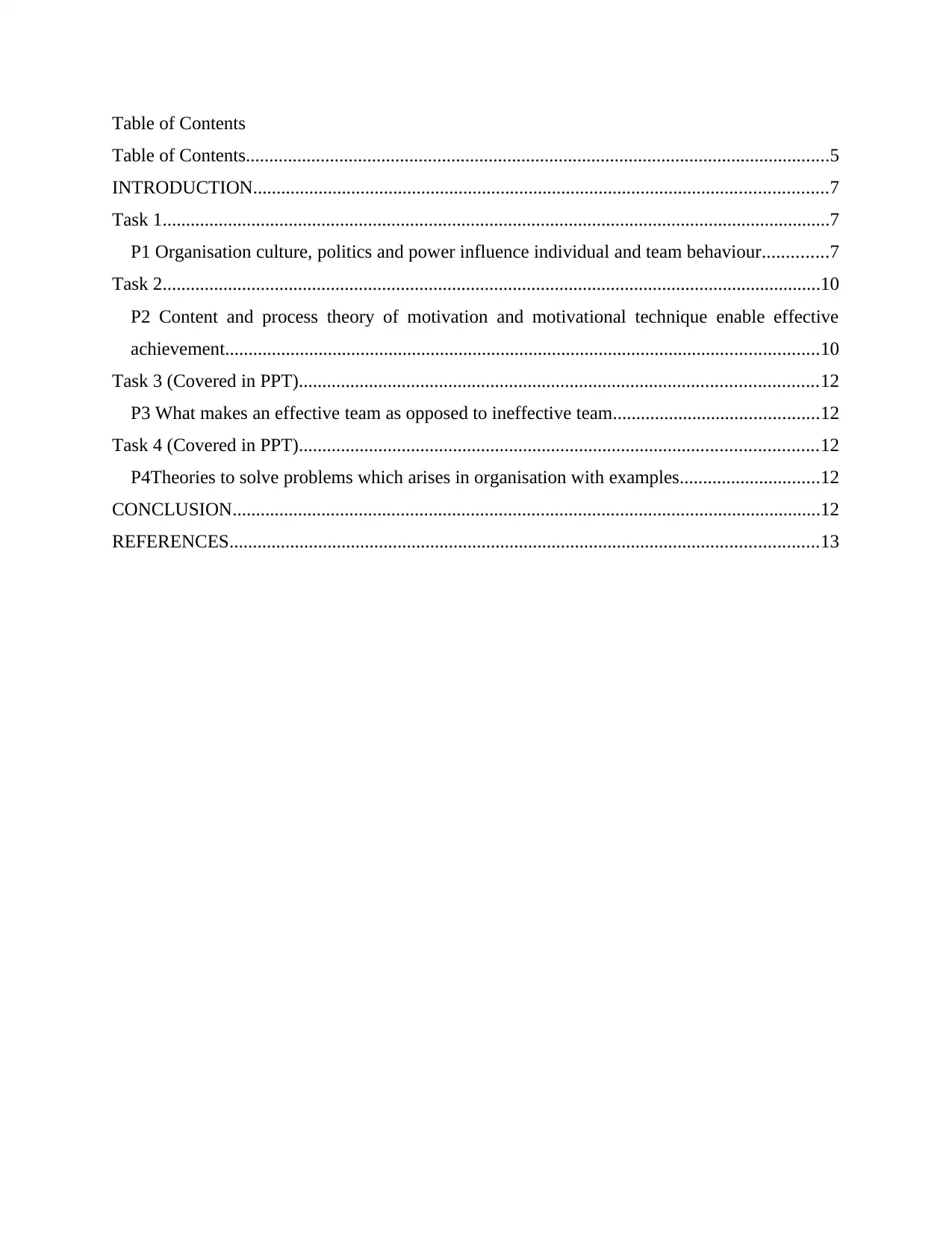
Table of Contents
Table of Contents.............................................................................................................................5
INTRODUCTION...........................................................................................................................7
Task 1...............................................................................................................................................7
P1 Organisation culture, politics and power influence individual and team behaviour..............7
Task 2.............................................................................................................................................10
P2 Content and process theory of motivation and motivational technique enable effective
achievement...............................................................................................................................10
Task 3 (Covered in PPT)...............................................................................................................12
P3 What makes an effective team as opposed to ineffective team............................................12
Task 4 (Covered in PPT)...............................................................................................................12
P4Theories to solve problems which arises in organisation with examples..............................12
CONCLUSION..............................................................................................................................12
REFERENCES..............................................................................................................................13
Table of Contents.............................................................................................................................5
INTRODUCTION...........................................................................................................................7
Task 1...............................................................................................................................................7
P1 Organisation culture, politics and power influence individual and team behaviour..............7
Task 2.............................................................................................................................................10
P2 Content and process theory of motivation and motivational technique enable effective
achievement...............................................................................................................................10
Task 3 (Covered in PPT)...............................................................................................................12
P3 What makes an effective team as opposed to ineffective team............................................12
Task 4 (Covered in PPT)...............................................................................................................12
P4Theories to solve problems which arises in organisation with examples..............................12
CONCLUSION..............................................................................................................................12
REFERENCES..............................................................................................................................13
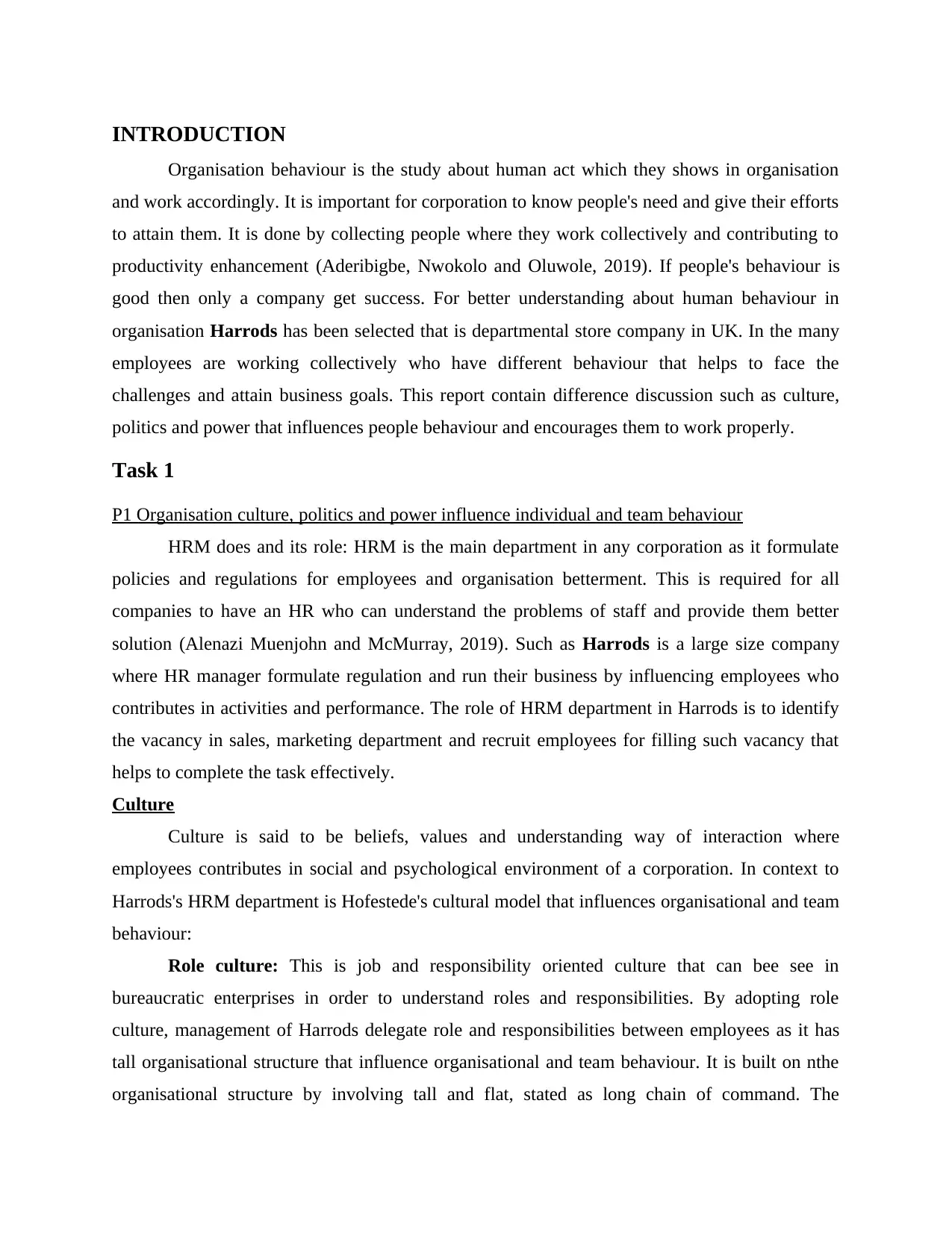
INTRODUCTION
Organisation behaviour is the study about human act which they shows in organisation
and work accordingly. It is important for corporation to know people's need and give their efforts
to attain them. It is done by collecting people where they work collectively and contributing to
productivity enhancement (Aderibigbe, Nwokolo and Oluwole, 2019). If people's behaviour is
good then only a company get success. For better understanding about human behaviour in
organisation Harrods has been selected that is departmental store company in UK. In the many
employees are working collectively who have different behaviour that helps to face the
challenges and attain business goals. This report contain difference discussion such as culture,
politics and power that influences people behaviour and encourages them to work properly.
Task 1
P1 Organisation culture, politics and power influence individual and team behaviour
HRM does and its role: HRM is the main department in any corporation as it formulate
policies and regulations for employees and organisation betterment. This is required for all
companies to have an HR who can understand the problems of staff and provide them better
solution (Alenazi Muenjohn and McMurray, 2019). Such as Harrods is a large size company
where HR manager formulate regulation and run their business by influencing employees who
contributes in activities and performance. The role of HRM department in Harrods is to identify
the vacancy in sales, marketing department and recruit employees for filling such vacancy that
helps to complete the task effectively.
Culture
Culture is said to be beliefs, values and understanding way of interaction where
employees contributes in social and psychological environment of a corporation. In context to
Harrods's HRM department is Hofestede's cultural model that influences organisational and team
behaviour:
Role culture: This is job and responsibility oriented culture that can bee see in
bureaucratic enterprises in order to understand roles and responsibilities. By adopting role
culture, management of Harrods delegate role and responsibilities between employees as it has
tall organisational structure that influence organisational and team behaviour. It is built on nthe
organisational structure by involving tall and flat, stated as long chain of command. The
Organisation behaviour is the study about human act which they shows in organisation
and work accordingly. It is important for corporation to know people's need and give their efforts
to attain them. It is done by collecting people where they work collectively and contributing to
productivity enhancement (Aderibigbe, Nwokolo and Oluwole, 2019). If people's behaviour is
good then only a company get success. For better understanding about human behaviour in
organisation Harrods has been selected that is departmental store company in UK. In the many
employees are working collectively who have different behaviour that helps to face the
challenges and attain business goals. This report contain difference discussion such as culture,
politics and power that influences people behaviour and encourages them to work properly.
Task 1
P1 Organisation culture, politics and power influence individual and team behaviour
HRM does and its role: HRM is the main department in any corporation as it formulate
policies and regulations for employees and organisation betterment. This is required for all
companies to have an HR who can understand the problems of staff and provide them better
solution (Alenazi Muenjohn and McMurray, 2019). Such as Harrods is a large size company
where HR manager formulate regulation and run their business by influencing employees who
contributes in activities and performance. The role of HRM department in Harrods is to identify
the vacancy in sales, marketing department and recruit employees for filling such vacancy that
helps to complete the task effectively.
Culture
Culture is said to be beliefs, values and understanding way of interaction where
employees contributes in social and psychological environment of a corporation. In context to
Harrods's HRM department is Hofestede's cultural model that influences organisational and team
behaviour:
Role culture: This is job and responsibility oriented culture that can bee see in
bureaucratic enterprises in order to understand roles and responsibilities. By adopting role
culture, management of Harrods delegate role and responsibilities between employees as it has
tall organisational structure that influence organisational and team behaviour. It is built on nthe
organisational structure by involving tall and flat, stated as long chain of command. The
⊘ This is a preview!⊘
Do you want full access?
Subscribe today to unlock all pages.

Trusted by 1+ million students worldwide
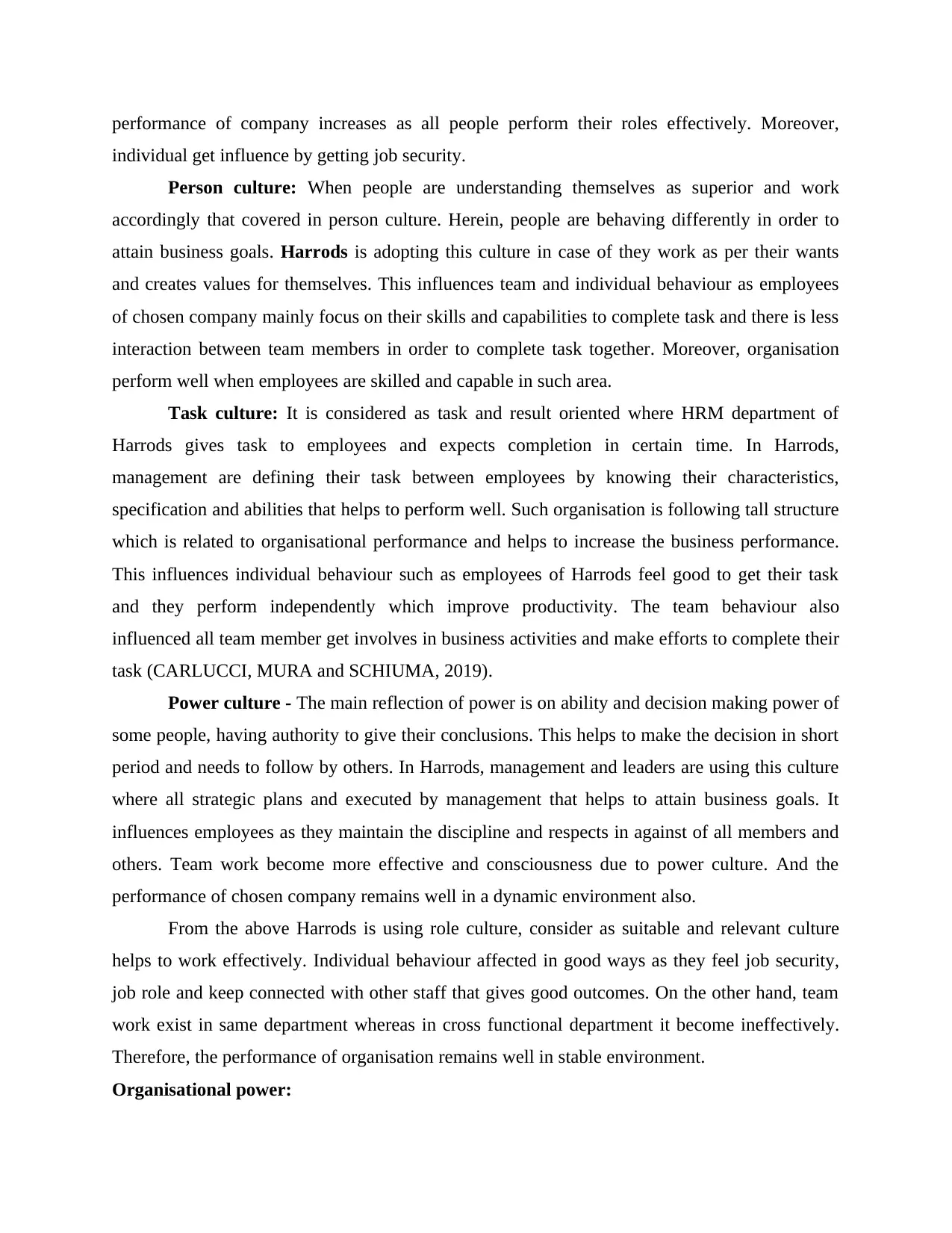
performance of company increases as all people perform their roles effectively. Moreover,
individual get influence by getting job security.
Person culture: When people are understanding themselves as superior and work
accordingly that covered in person culture. Herein, people are behaving differently in order to
attain business goals. Harrods is adopting this culture in case of they work as per their wants
and creates values for themselves. This influences team and individual behaviour as employees
of chosen company mainly focus on their skills and capabilities to complete task and there is less
interaction between team members in order to complete task together. Moreover, organisation
perform well when employees are skilled and capable in such area.
Task culture: It is considered as task and result oriented where HRM department of
Harrods gives task to employees and expects completion in certain time. In Harrods,
management are defining their task between employees by knowing their characteristics,
specification and abilities that helps to perform well. Such organisation is following tall structure
which is related to organisational performance and helps to increase the business performance.
This influences individual behaviour such as employees of Harrods feel good to get their task
and they perform independently which improve productivity. The team behaviour also
influenced all team member get involves in business activities and make efforts to complete their
task (CARLUCCI, MURA and SCHIUMA, 2019).
Power culture - The main reflection of power is on ability and decision making power of
some people, having authority to give their conclusions. This helps to make the decision in short
period and needs to follow by others. In Harrods, management and leaders are using this culture
where all strategic plans and executed by management that helps to attain business goals. It
influences employees as they maintain the discipline and respects in against of all members and
others. Team work become more effective and consciousness due to power culture. And the
performance of chosen company remains well in a dynamic environment also.
From the above Harrods is using role culture, consider as suitable and relevant culture
helps to work effectively. Individual behaviour affected in good ways as they feel job security,
job role and keep connected with other staff that gives good outcomes. On the other hand, team
work exist in same department whereas in cross functional department it become ineffectively.
Therefore, the performance of organisation remains well in stable environment.
Organisational power:
individual get influence by getting job security.
Person culture: When people are understanding themselves as superior and work
accordingly that covered in person culture. Herein, people are behaving differently in order to
attain business goals. Harrods is adopting this culture in case of they work as per their wants
and creates values for themselves. This influences team and individual behaviour as employees
of chosen company mainly focus on their skills and capabilities to complete task and there is less
interaction between team members in order to complete task together. Moreover, organisation
perform well when employees are skilled and capable in such area.
Task culture: It is considered as task and result oriented where HRM department of
Harrods gives task to employees and expects completion in certain time. In Harrods,
management are defining their task between employees by knowing their characteristics,
specification and abilities that helps to perform well. Such organisation is following tall structure
which is related to organisational performance and helps to increase the business performance.
This influences individual behaviour such as employees of Harrods feel good to get their task
and they perform independently which improve productivity. The team behaviour also
influenced all team member get involves in business activities and make efforts to complete their
task (CARLUCCI, MURA and SCHIUMA, 2019).
Power culture - The main reflection of power is on ability and decision making power of
some people, having authority to give their conclusions. This helps to make the decision in short
period and needs to follow by others. In Harrods, management and leaders are using this culture
where all strategic plans and executed by management that helps to attain business goals. It
influences employees as they maintain the discipline and respects in against of all members and
others. Team work become more effective and consciousness due to power culture. And the
performance of chosen company remains well in a dynamic environment also.
From the above Harrods is using role culture, consider as suitable and relevant culture
helps to work effectively. Individual behaviour affected in good ways as they feel job security,
job role and keep connected with other staff that gives good outcomes. On the other hand, team
work exist in same department whereas in cross functional department it become ineffectively.
Therefore, the performance of organisation remains well in stable environment.
Organisational power:
Paraphrase This Document
Need a fresh take? Get an instant paraphrase of this document with our AI Paraphraser
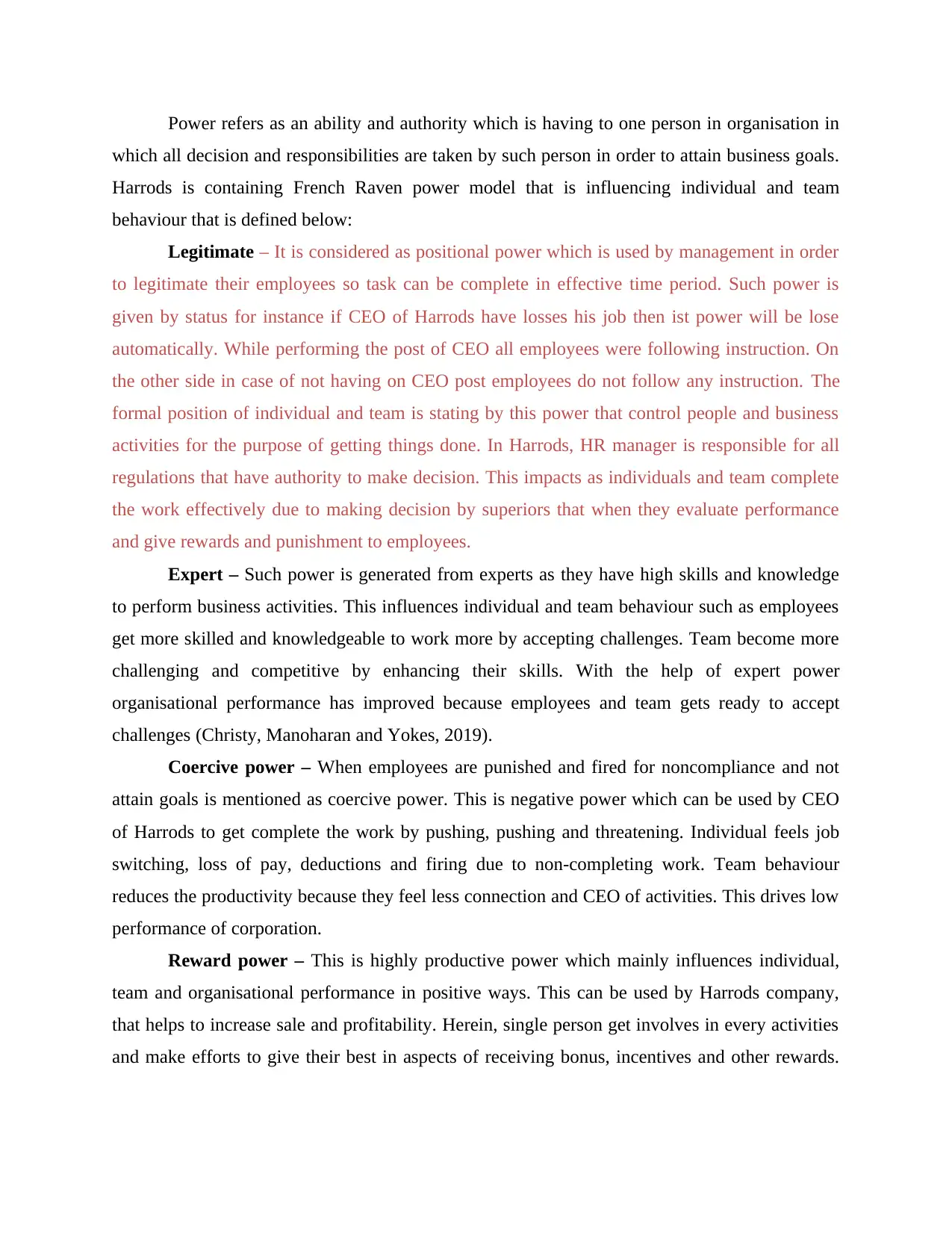
Power refers as an ability and authority which is having to one person in organisation in
which all decision and responsibilities are taken by such person in order to attain business goals.
Harrods is containing French Raven power model that is influencing individual and team
behaviour that is defined below:
Legitimate – It is considered as positional power which is used by management in order
to legitimate their employees so task can be complete in effective time period. Such power is
given by status for instance if CEO of Harrods have losses his job then ist power will be lose
automatically. While performing the post of CEO all employees were following instruction. On
the other side in case of not having on CEO post employees do not follow any instruction. The
formal position of individual and team is stating by this power that control people and business
activities for the purpose of getting things done. In Harrods, HR manager is responsible for all
regulations that have authority to make decision. This impacts as individuals and team complete
the work effectively due to making decision by superiors that when they evaluate performance
and give rewards and punishment to employees.
Expert – Such power is generated from experts as they have high skills and knowledge
to perform business activities. This influences individual and team behaviour such as employees
get more skilled and knowledgeable to work more by accepting challenges. Team become more
challenging and competitive by enhancing their skills. With the help of expert power
organisational performance has improved because employees and team gets ready to accept
challenges (Christy, Manoharan and Yokes, 2019).
Coercive power – When employees are punished and fired for noncompliance and not
attain goals is mentioned as coercive power. This is negative power which can be used by CEO
of Harrods to get complete the work by pushing, pushing and threatening. Individual feels job
switching, loss of pay, deductions and firing due to non-completing work. Team behaviour
reduces the productivity because they feel less connection and CEO of activities. This drives low
performance of corporation.
Reward power – This is highly productive power which mainly influences individual,
team and organisational performance in positive ways. This can be used by Harrods company,
that helps to increase sale and profitability. Herein, single person get involves in every activities
and make efforts to give their best in aspects of receiving bonus, incentives and other rewards.
which all decision and responsibilities are taken by such person in order to attain business goals.
Harrods is containing French Raven power model that is influencing individual and team
behaviour that is defined below:
Legitimate – It is considered as positional power which is used by management in order
to legitimate their employees so task can be complete in effective time period. Such power is
given by status for instance if CEO of Harrods have losses his job then ist power will be lose
automatically. While performing the post of CEO all employees were following instruction. On
the other side in case of not having on CEO post employees do not follow any instruction. The
formal position of individual and team is stating by this power that control people and business
activities for the purpose of getting things done. In Harrods, HR manager is responsible for all
regulations that have authority to make decision. This impacts as individuals and team complete
the work effectively due to making decision by superiors that when they evaluate performance
and give rewards and punishment to employees.
Expert – Such power is generated from experts as they have high skills and knowledge
to perform business activities. This influences individual and team behaviour such as employees
get more skilled and knowledgeable to work more by accepting challenges. Team become more
challenging and competitive by enhancing their skills. With the help of expert power
organisational performance has improved because employees and team gets ready to accept
challenges (Christy, Manoharan and Yokes, 2019).
Coercive power – When employees are punished and fired for noncompliance and not
attain goals is mentioned as coercive power. This is negative power which can be used by CEO
of Harrods to get complete the work by pushing, pushing and threatening. Individual feels job
switching, loss of pay, deductions and firing due to non-completing work. Team behaviour
reduces the productivity because they feel less connection and CEO of activities. This drives low
performance of corporation.
Reward power – This is highly productive power which mainly influences individual,
team and organisational performance in positive ways. This can be used by Harrods company,
that helps to increase sale and profitability. Herein, single person get involves in every activities
and make efforts to give their best in aspects of receiving bonus, incentives and other rewards.
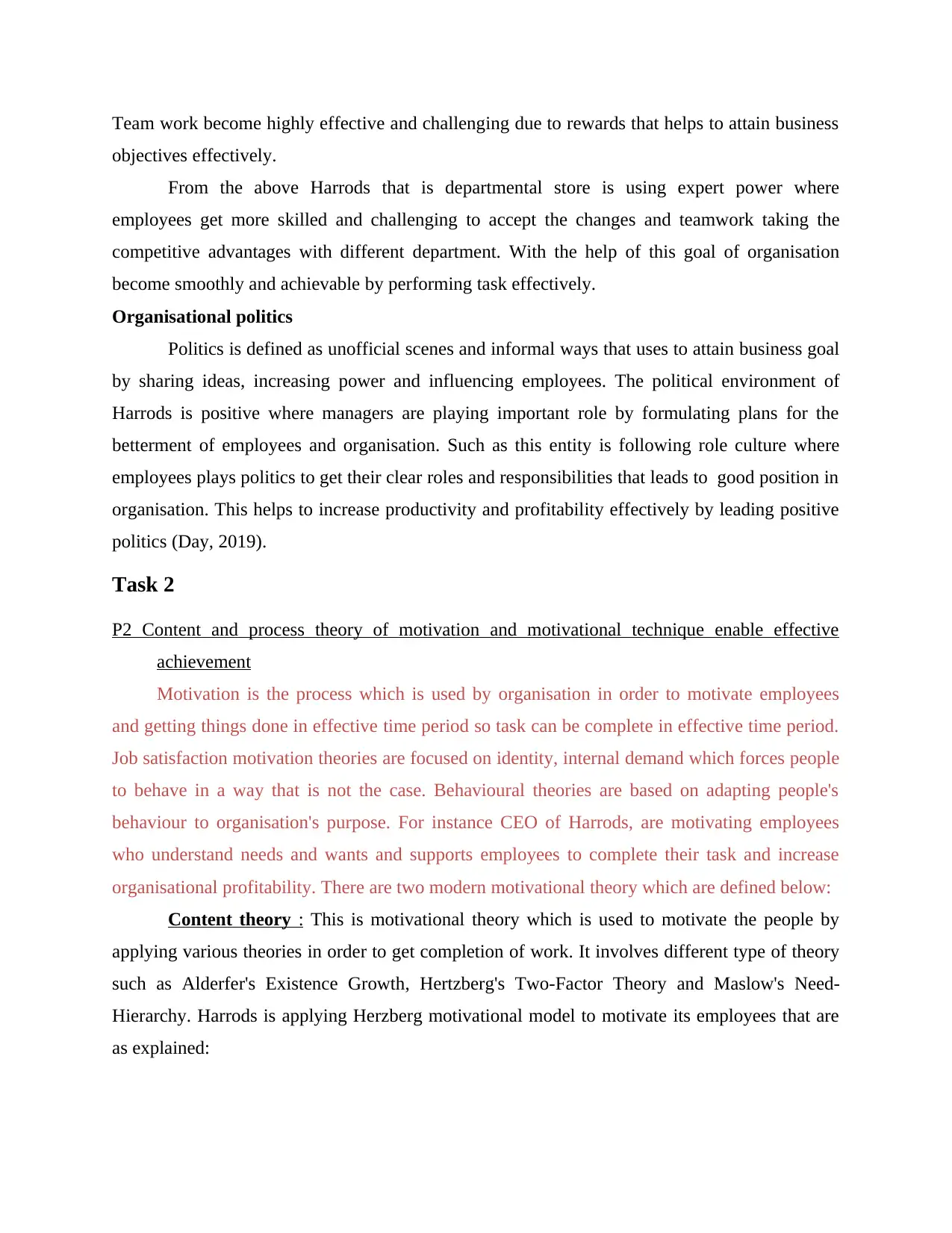
Team work become highly effective and challenging due to rewards that helps to attain business
objectives effectively.
From the above Harrods that is departmental store is using expert power where
employees get more skilled and challenging to accept the changes and teamwork taking the
competitive advantages with different department. With the help of this goal of organisation
become smoothly and achievable by performing task effectively.
Organisational politics
Politics is defined as unofficial scenes and informal ways that uses to attain business goal
by sharing ideas, increasing power and influencing employees. The political environment of
Harrods is positive where managers are playing important role by formulating plans for the
betterment of employees and organisation. Such as this entity is following role culture where
employees plays politics to get their clear roles and responsibilities that leads to good position in
organisation. This helps to increase productivity and profitability effectively by leading positive
politics (Day, 2019).
Task 2
P2 Content and process theory of motivation and motivational technique enable effective
achievement
Motivation is the process which is used by organisation in order to motivate employees
and getting things done in effective time period so task can be complete in effective time period.
Job satisfaction motivation theories are focused on identity, internal demand which forces people
to behave in a way that is not the case. Behavioural theories are based on adapting people's
behaviour to organisation's purpose. For instance CEO of Harrods, are motivating employees
who understand needs and wants and supports employees to complete their task and increase
organisational profitability. There are two modern motivational theory which are defined below:
Content theory : This is motivational theory which is used to motivate the people by
applying various theories in order to get completion of work. It involves different type of theory
such as Alderfer's Existence Growth, Hertzberg's Two-Factor Theory and Maslow's Need-
Hierarchy. Harrods is applying Herzberg motivational model to motivate its employees that are
as explained:
objectives effectively.
From the above Harrods that is departmental store is using expert power where
employees get more skilled and challenging to accept the changes and teamwork taking the
competitive advantages with different department. With the help of this goal of organisation
become smoothly and achievable by performing task effectively.
Organisational politics
Politics is defined as unofficial scenes and informal ways that uses to attain business goal
by sharing ideas, increasing power and influencing employees. The political environment of
Harrods is positive where managers are playing important role by formulating plans for the
betterment of employees and organisation. Such as this entity is following role culture where
employees plays politics to get their clear roles and responsibilities that leads to good position in
organisation. This helps to increase productivity and profitability effectively by leading positive
politics (Day, 2019).
Task 2
P2 Content and process theory of motivation and motivational technique enable effective
achievement
Motivation is the process which is used by organisation in order to motivate employees
and getting things done in effective time period so task can be complete in effective time period.
Job satisfaction motivation theories are focused on identity, internal demand which forces people
to behave in a way that is not the case. Behavioural theories are based on adapting people's
behaviour to organisation's purpose. For instance CEO of Harrods, are motivating employees
who understand needs and wants and supports employees to complete their task and increase
organisational profitability. There are two modern motivational theory which are defined below:
Content theory : This is motivational theory which is used to motivate the people by
applying various theories in order to get completion of work. It involves different type of theory
such as Alderfer's Existence Growth, Hertzberg's Two-Factor Theory and Maslow's Need-
Hierarchy. Harrods is applying Herzberg motivational model to motivate its employees that are
as explained:
⊘ This is a preview!⊘
Do you want full access?
Subscribe today to unlock all pages.

Trusted by 1+ million students worldwide
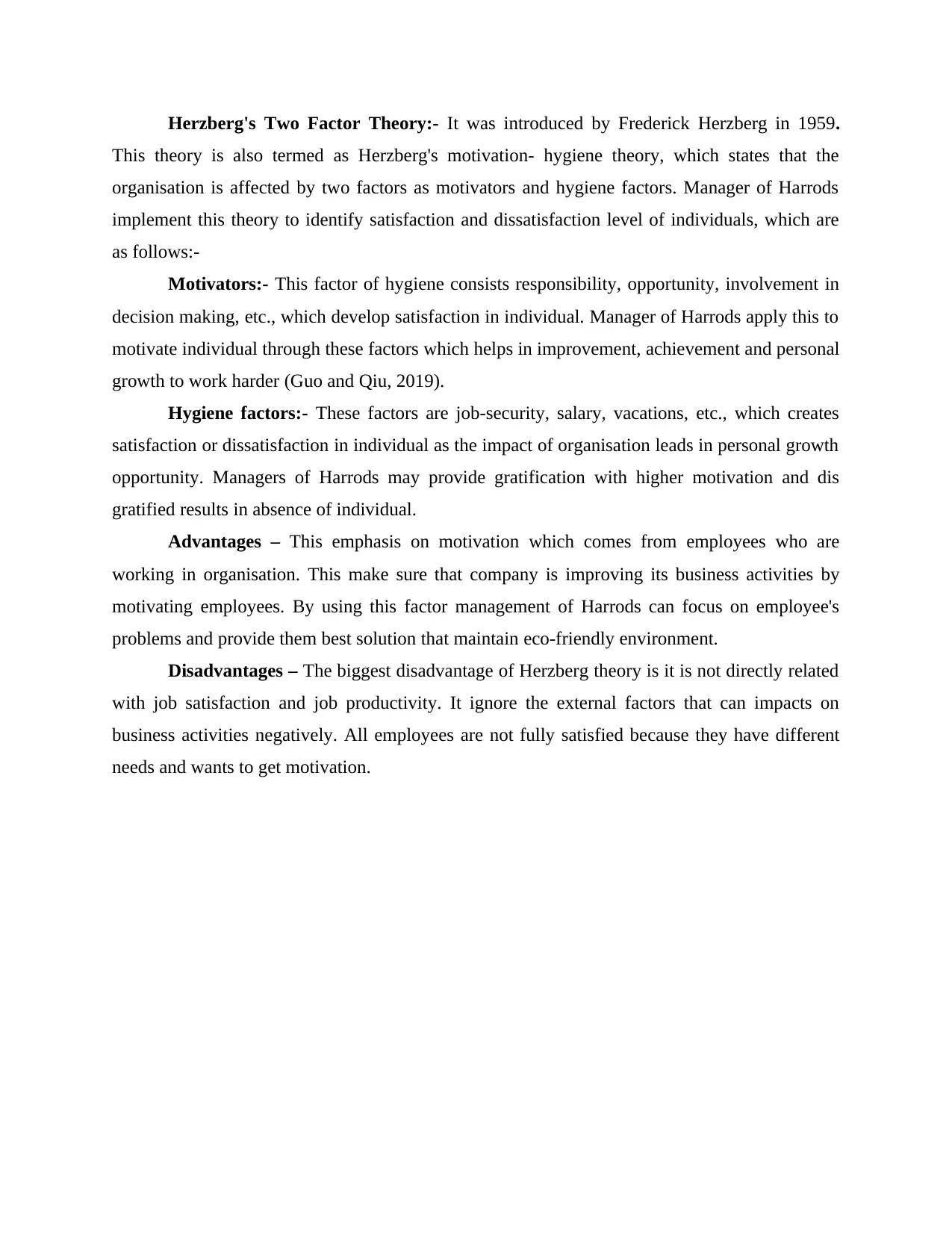
Herzberg's Two Factor Theory:- It was introduced by Frederick Herzberg in 1959.
This theory is also termed as Herzberg's motivation- hygiene theory, which states that the
organisation is affected by two factors as motivators and hygiene factors. Manager of Harrods
implement this theory to identify satisfaction and dissatisfaction level of individuals, which are
as follows:-
Motivators:- This factor of hygiene consists responsibility, opportunity, involvement in
decision making, etc., which develop satisfaction in individual. Manager of Harrods apply this to
motivate individual through these factors which helps in improvement, achievement and personal
growth to work harder (Guo and Qiu, 2019).
Hygiene factors:- These factors are job-security, salary, vacations, etc., which creates
satisfaction or dissatisfaction in individual as the impact of organisation leads in personal growth
opportunity. Managers of Harrods may provide gratification with higher motivation and dis
gratified results in absence of individual.
Advantages – This emphasis on motivation which comes from employees who are
working in organisation. This make sure that company is improving its business activities by
motivating employees. By using this factor management of Harrods can focus on employee's
problems and provide them best solution that maintain eco-friendly environment.
Disadvantages – The biggest disadvantage of Herzberg theory is it is not directly related
with job satisfaction and job productivity. It ignore the external factors that can impacts on
business activities negatively. All employees are not fully satisfied because they have different
needs and wants to get motivation.
This theory is also termed as Herzberg's motivation- hygiene theory, which states that the
organisation is affected by two factors as motivators and hygiene factors. Manager of Harrods
implement this theory to identify satisfaction and dissatisfaction level of individuals, which are
as follows:-
Motivators:- This factor of hygiene consists responsibility, opportunity, involvement in
decision making, etc., which develop satisfaction in individual. Manager of Harrods apply this to
motivate individual through these factors which helps in improvement, achievement and personal
growth to work harder (Guo and Qiu, 2019).
Hygiene factors:- These factors are job-security, salary, vacations, etc., which creates
satisfaction or dissatisfaction in individual as the impact of organisation leads in personal growth
opportunity. Managers of Harrods may provide gratification with higher motivation and dis
gratified results in absence of individual.
Advantages – This emphasis on motivation which comes from employees who are
working in organisation. This make sure that company is improving its business activities by
motivating employees. By using this factor management of Harrods can focus on employee's
problems and provide them best solution that maintain eco-friendly environment.
Disadvantages – The biggest disadvantage of Herzberg theory is it is not directly related
with job satisfaction and job productivity. It ignore the external factors that can impacts on
business activities negatively. All employees are not fully satisfied because they have different
needs and wants to get motivation.
Paraphrase This Document
Need a fresh take? Get an instant paraphrase of this document with our AI Paraphraser
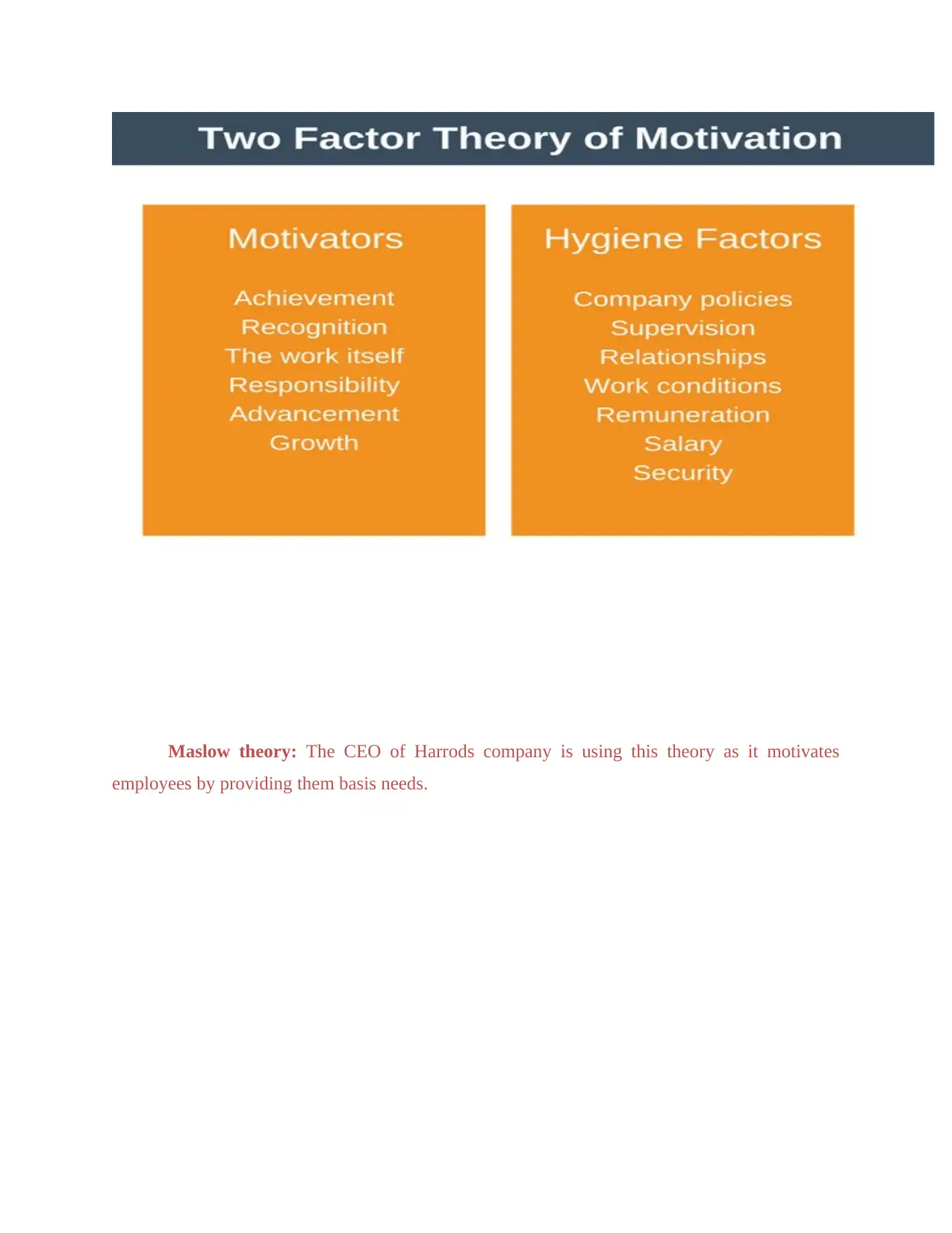
Maslow theory: The CEO of Harrods company is using this theory as it motivates
employees by providing them basis needs.
employees by providing them basis needs.
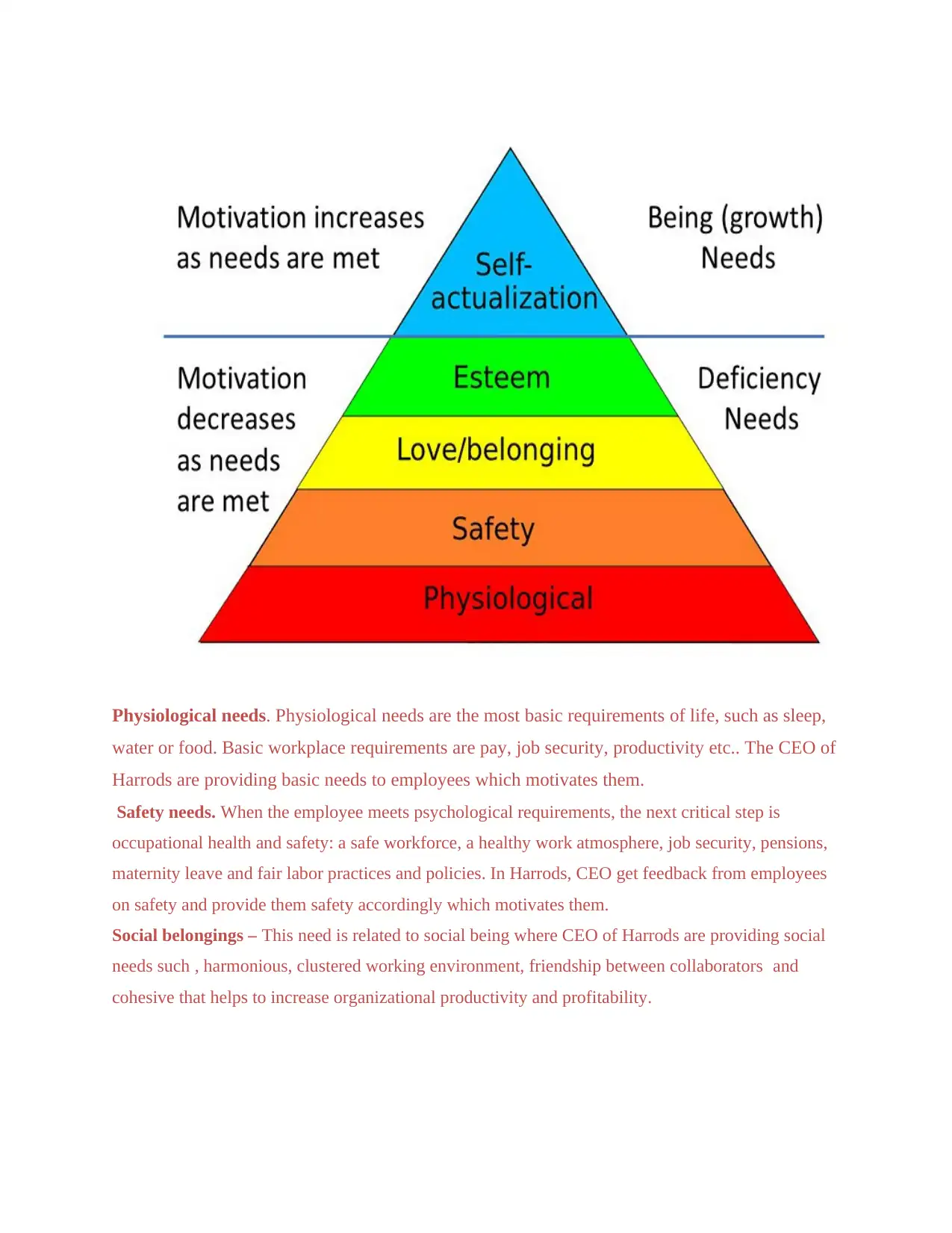
Physiological needs. Physiological needs are the most basic requirements of life, such as sleep,
water or food. Basic workplace requirements are pay, job security, productivity etc.. The CEO of
Harrods are providing basic needs to employees which motivates them.
Safety needs. When the employee meets psychological requirements, the next critical step is
occupational health and safety: a safe workforce, a healthy work atmosphere, job security, pensions,
maternity leave and fair labor practices and policies. In Harrods, CEO get feedback from employees
on safety and provide them safety accordingly which motivates them.
Social belongings – This need is related to social being where CEO of Harrods are providing social
needs such , harmonious, clustered working environment, friendship between collaborators and
cohesive that helps to increase organizational productivity and profitability.
water or food. Basic workplace requirements are pay, job security, productivity etc.. The CEO of
Harrods are providing basic needs to employees which motivates them.
Safety needs. When the employee meets psychological requirements, the next critical step is
occupational health and safety: a safe workforce, a healthy work atmosphere, job security, pensions,
maternity leave and fair labor practices and policies. In Harrods, CEO get feedback from employees
on safety and provide them safety accordingly which motivates them.
Social belongings – This need is related to social being where CEO of Harrods are providing social
needs such , harmonious, clustered working environment, friendship between collaborators and
cohesive that helps to increase organizational productivity and profitability.
⊘ This is a preview!⊘
Do you want full access?
Subscribe today to unlock all pages.

Trusted by 1+ million students worldwide
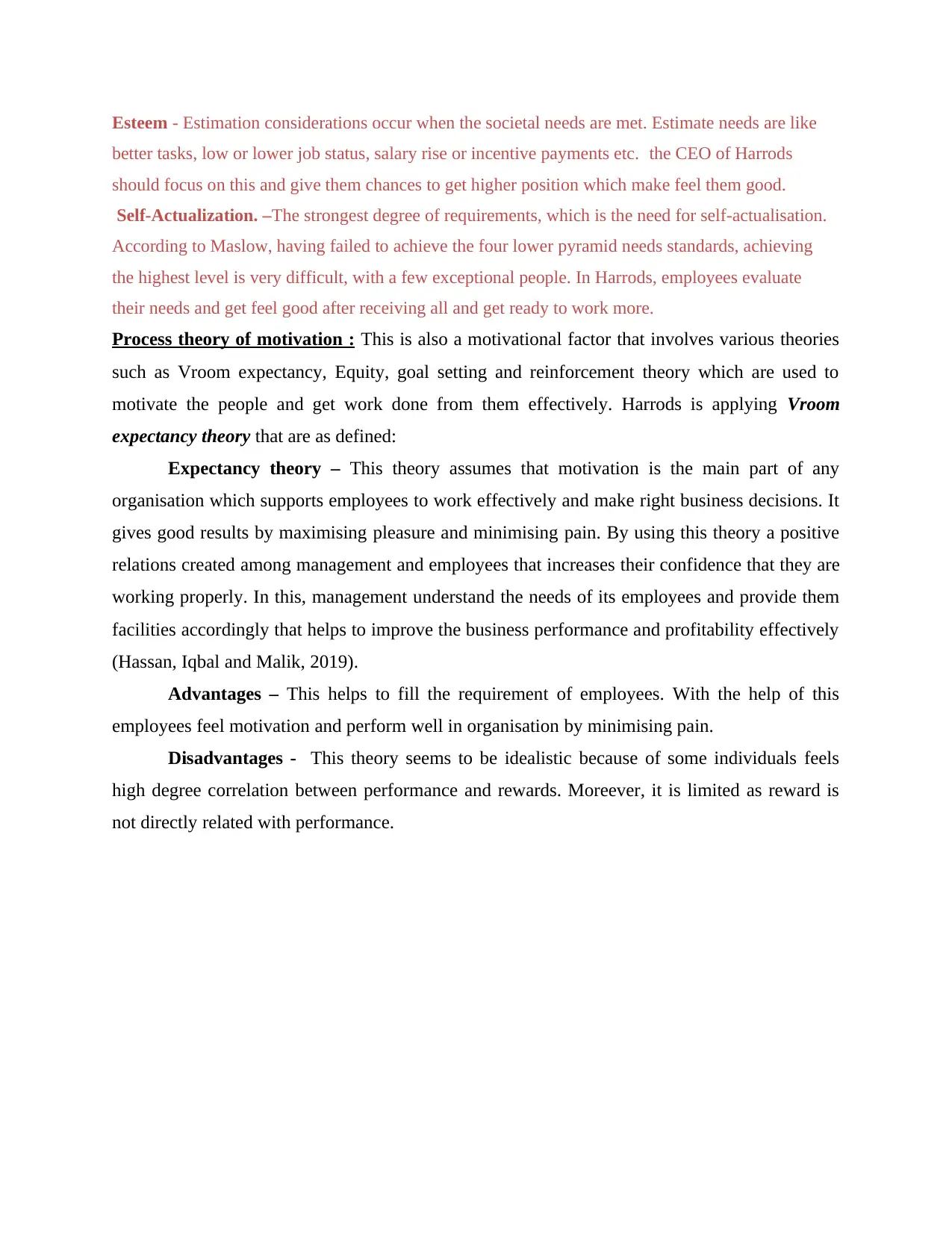
Esteem - Estimation considerations occur when the societal needs are met. Estimate needs are like
better tasks, low or lower job status, salary rise or incentive payments etc. the CEO of Harrods
should focus on this and give them chances to get higher position which make feel them good.
Self-Actualization. –The strongest degree of requirements, which is the need for self-actualisation.
According to Maslow, having failed to achieve the four lower pyramid needs standards, achieving
the highest level is very difficult, with a few exceptional people. In Harrods, employees evaluate
their needs and get feel good after receiving all and get ready to work more.
Process theory of motivation : This is also a motivational factor that involves various theories
such as Vroom expectancy, Equity, goal setting and reinforcement theory which are used to
motivate the people and get work done from them effectively. Harrods is applying Vroom
expectancy theory that are as defined:
Expectancy theory – This theory assumes that motivation is the main part of any
organisation which supports employees to work effectively and make right business decisions. It
gives good results by maximising pleasure and minimising pain. By using this theory a positive
relations created among management and employees that increases their confidence that they are
working properly. In this, management understand the needs of its employees and provide them
facilities accordingly that helps to improve the business performance and profitability effectively
(Hassan, Iqbal and Malik, 2019).
Advantages – This helps to fill the requirement of employees. With the help of this
employees feel motivation and perform well in organisation by minimising pain.
Disadvantages - This theory seems to be idealistic because of some individuals feels
high degree correlation between performance and rewards. Moreever, it is limited as reward is
not directly related with performance.
better tasks, low or lower job status, salary rise or incentive payments etc. the CEO of Harrods
should focus on this and give them chances to get higher position which make feel them good.
Self-Actualization. –The strongest degree of requirements, which is the need for self-actualisation.
According to Maslow, having failed to achieve the four lower pyramid needs standards, achieving
the highest level is very difficult, with a few exceptional people. In Harrods, employees evaluate
their needs and get feel good after receiving all and get ready to work more.
Process theory of motivation : This is also a motivational factor that involves various theories
such as Vroom expectancy, Equity, goal setting and reinforcement theory which are used to
motivate the people and get work done from them effectively. Harrods is applying Vroom
expectancy theory that are as defined:
Expectancy theory – This theory assumes that motivation is the main part of any
organisation which supports employees to work effectively and make right business decisions. It
gives good results by maximising pleasure and minimising pain. By using this theory a positive
relations created among management and employees that increases their confidence that they are
working properly. In this, management understand the needs of its employees and provide them
facilities accordingly that helps to improve the business performance and profitability effectively
(Hassan, Iqbal and Malik, 2019).
Advantages – This helps to fill the requirement of employees. With the help of this
employees feel motivation and perform well in organisation by minimising pain.
Disadvantages - This theory seems to be idealistic because of some individuals feels
high degree correlation between performance and rewards. Moreever, it is limited as reward is
not directly related with performance.
Paraphrase This Document
Need a fresh take? Get an instant paraphrase of this document with our AI Paraphraser
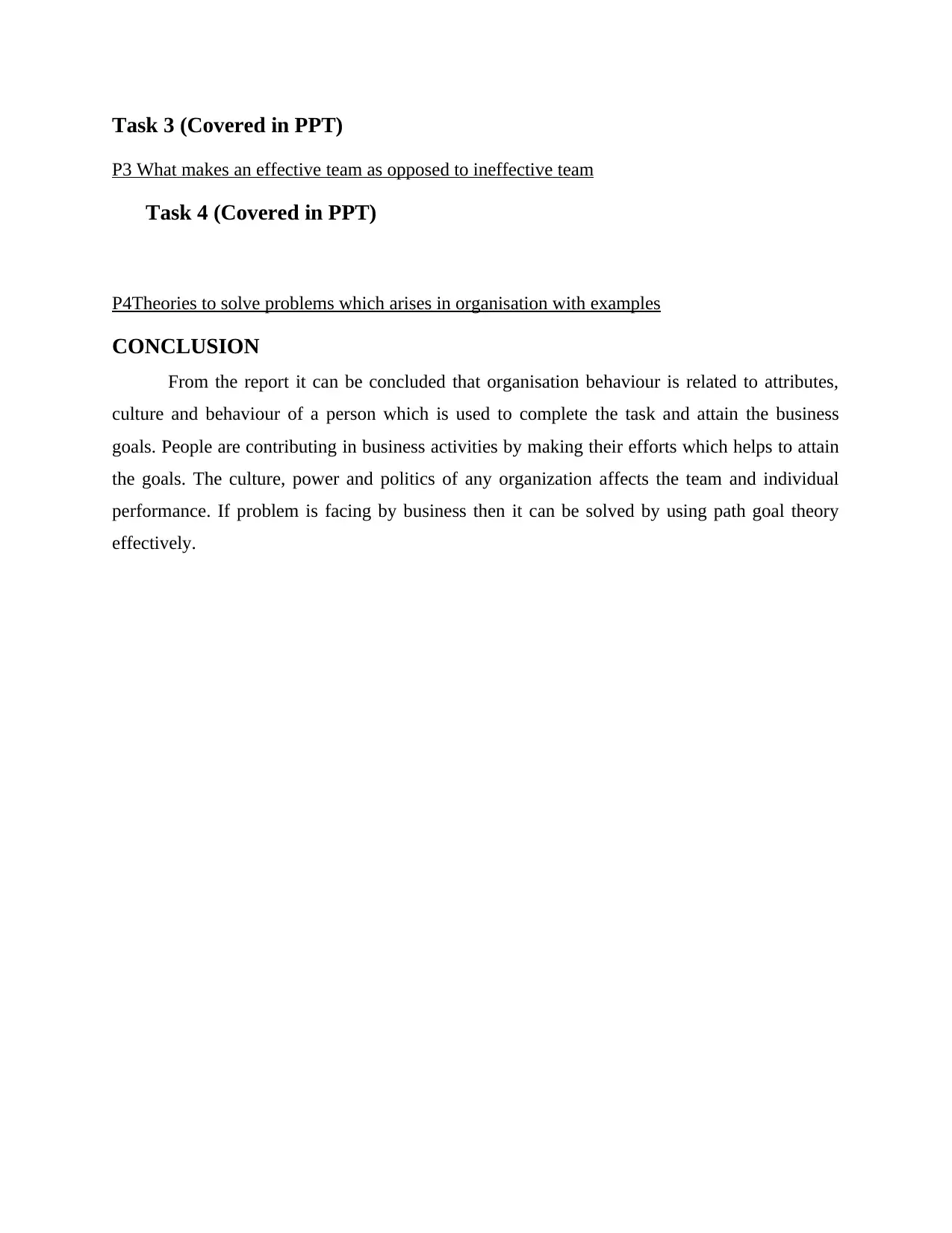
Task 3 (Covered in PPT)
P3 What makes an effective team as opposed to ineffective team
Task 4 (Covered in PPT)
P4Theories to solve problems which arises in organisation with examples
CONCLUSION
From the report it can be concluded that organisation behaviour is related to attributes,
culture and behaviour of a person which is used to complete the task and attain the business
goals. People are contributing in business activities by making their efforts which helps to attain
the goals. The culture, power and politics of any organization affects the team and individual
performance. If problem is facing by business then it can be solved by using path goal theory
effectively.
P3 What makes an effective team as opposed to ineffective team
Task 4 (Covered in PPT)
P4Theories to solve problems which arises in organisation with examples
CONCLUSION
From the report it can be concluded that organisation behaviour is related to attributes,
culture and behaviour of a person which is used to complete the task and attain the business
goals. People are contributing in business activities by making their efforts which helps to attain
the goals. The culture, power and politics of any organization affects the team and individual
performance. If problem is facing by business then it can be solved by using path goal theory
effectively.
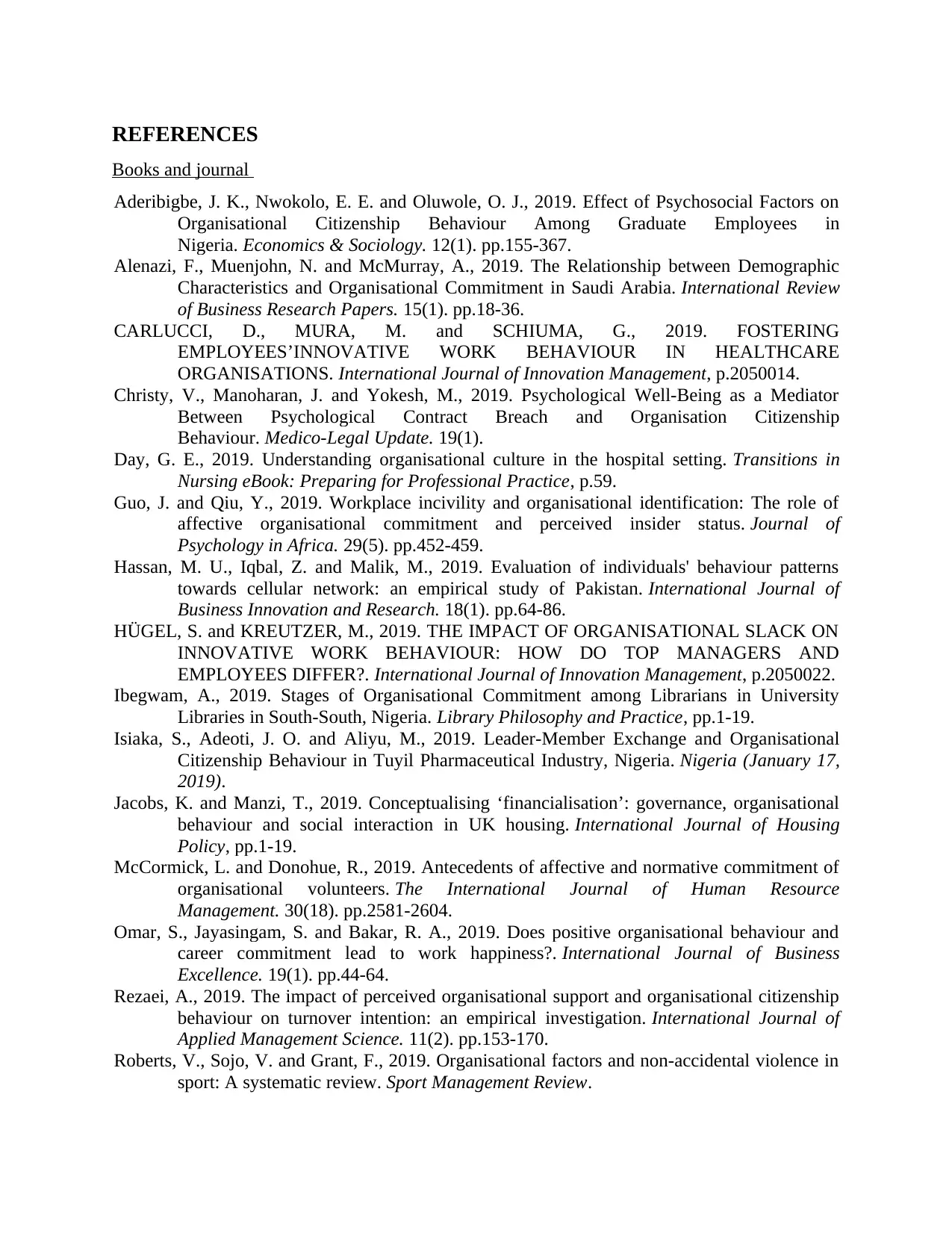
REFERENCES
Books and journal
Aderibigbe, J. K., Nwokolo, E. E. and Oluwole, O. J., 2019. Effect of Psychosocial Factors on
Organisational Citizenship Behaviour Among Graduate Employees in
Nigeria. Economics & Sociology. 12(1). pp.155-367.
Alenazi, F., Muenjohn, N. and McMurray, A., 2019. The Relationship between Demographic
Characteristics and Organisational Commitment in Saudi Arabia. International Review
of Business Research Papers. 15(1). pp.18-36.
CARLUCCI, D., MURA, M. and SCHIUMA, G., 2019. FOSTERING
EMPLOYEES’INNOVATIVE WORK BEHAVIOUR IN HEALTHCARE
ORGANISATIONS. International Journal of Innovation Management, p.2050014.
Christy, V., Manoharan, J. and Yokesh, M., 2019. Psychological Well-Being as a Mediator
Between Psychological Contract Breach and Organisation Citizenship
Behaviour. Medico-Legal Update. 19(1).
Day, G. E., 2019. Understanding organisational culture in the hospital setting. Transitions in
Nursing eBook: Preparing for Professional Practice, p.59.
Guo, J. and Qiu, Y., 2019. Workplace incivility and organisational identification: The role of
affective organisational commitment and perceived insider status. Journal of
Psychology in Africa. 29(5). pp.452-459.
Hassan, M. U., Iqbal, Z. and Malik, M., 2019. Evaluation of individuals' behaviour patterns
towards cellular network: an empirical study of Pakistan. International Journal of
Business Innovation and Research. 18(1). pp.64-86.
HÜGEL, S. and KREUTZER, M., 2019. THE IMPACT OF ORGANISATIONAL SLACK ON
INNOVATIVE WORK BEHAVIOUR: HOW DO TOP MANAGERS AND
EMPLOYEES DIFFER?. International Journal of Innovation Management, p.2050022.
Ibegwam, A., 2019. Stages of Organisational Commitment among Librarians in University
Libraries in South-South, Nigeria. Library Philosophy and Practice, pp.1-19.
Isiaka, S., Adeoti, J. O. and Aliyu, M., 2019. Leader-Member Exchange and Organisational
Citizenship Behaviour in Tuyil Pharmaceutical Industry, Nigeria. Nigeria (January 17,
2019).
Jacobs, K. and Manzi, T., 2019. Conceptualising ‘financialisation’: governance, organisational
behaviour and social interaction in UK housing. International Journal of Housing
Policy, pp.1-19.
McCormick, L. and Donohue, R., 2019. Antecedents of affective and normative commitment of
organisational volunteers. The International Journal of Human Resource
Management. 30(18). pp.2581-2604.
Omar, S., Jayasingam, S. and Bakar, R. A., 2019. Does positive organisational behaviour and
career commitment lead to work happiness?. International Journal of Business
Excellence. 19(1). pp.44-64.
Rezaei, A., 2019. The impact of perceived organisational support and organisational citizenship
behaviour on turnover intention: an empirical investigation. International Journal of
Applied Management Science. 11(2). pp.153-170.
Roberts, V., Sojo, V. and Grant, F., 2019. Organisational factors and non-accidental violence in
sport: A systematic review. Sport Management Review.
Books and journal
Aderibigbe, J. K., Nwokolo, E. E. and Oluwole, O. J., 2019. Effect of Psychosocial Factors on
Organisational Citizenship Behaviour Among Graduate Employees in
Nigeria. Economics & Sociology. 12(1). pp.155-367.
Alenazi, F., Muenjohn, N. and McMurray, A., 2019. The Relationship between Demographic
Characteristics and Organisational Commitment in Saudi Arabia. International Review
of Business Research Papers. 15(1). pp.18-36.
CARLUCCI, D., MURA, M. and SCHIUMA, G., 2019. FOSTERING
EMPLOYEES’INNOVATIVE WORK BEHAVIOUR IN HEALTHCARE
ORGANISATIONS. International Journal of Innovation Management, p.2050014.
Christy, V., Manoharan, J. and Yokesh, M., 2019. Psychological Well-Being as a Mediator
Between Psychological Contract Breach and Organisation Citizenship
Behaviour. Medico-Legal Update. 19(1).
Day, G. E., 2019. Understanding organisational culture in the hospital setting. Transitions in
Nursing eBook: Preparing for Professional Practice, p.59.
Guo, J. and Qiu, Y., 2019. Workplace incivility and organisational identification: The role of
affective organisational commitment and perceived insider status. Journal of
Psychology in Africa. 29(5). pp.452-459.
Hassan, M. U., Iqbal, Z. and Malik, M., 2019. Evaluation of individuals' behaviour patterns
towards cellular network: an empirical study of Pakistan. International Journal of
Business Innovation and Research. 18(1). pp.64-86.
HÜGEL, S. and KREUTZER, M., 2019. THE IMPACT OF ORGANISATIONAL SLACK ON
INNOVATIVE WORK BEHAVIOUR: HOW DO TOP MANAGERS AND
EMPLOYEES DIFFER?. International Journal of Innovation Management, p.2050022.
Ibegwam, A., 2019. Stages of Organisational Commitment among Librarians in University
Libraries in South-South, Nigeria. Library Philosophy and Practice, pp.1-19.
Isiaka, S., Adeoti, J. O. and Aliyu, M., 2019. Leader-Member Exchange and Organisational
Citizenship Behaviour in Tuyil Pharmaceutical Industry, Nigeria. Nigeria (January 17,
2019).
Jacobs, K. and Manzi, T., 2019. Conceptualising ‘financialisation’: governance, organisational
behaviour and social interaction in UK housing. International Journal of Housing
Policy, pp.1-19.
McCormick, L. and Donohue, R., 2019. Antecedents of affective and normative commitment of
organisational volunteers. The International Journal of Human Resource
Management. 30(18). pp.2581-2604.
Omar, S., Jayasingam, S. and Bakar, R. A., 2019. Does positive organisational behaviour and
career commitment lead to work happiness?. International Journal of Business
Excellence. 19(1). pp.44-64.
Rezaei, A., 2019. The impact of perceived organisational support and organisational citizenship
behaviour on turnover intention: an empirical investigation. International Journal of
Applied Management Science. 11(2). pp.153-170.
Roberts, V., Sojo, V. and Grant, F., 2019. Organisational factors and non-accidental violence in
sport: A systematic review. Sport Management Review.
⊘ This is a preview!⊘
Do you want full access?
Subscribe today to unlock all pages.

Trusted by 1+ million students worldwide
1 out of 13
Related Documents
Your All-in-One AI-Powered Toolkit for Academic Success.
+13062052269
info@desklib.com
Available 24*7 on WhatsApp / Email
![[object Object]](/_next/static/media/star-bottom.7253800d.svg)
Unlock your academic potential
Copyright © 2020–2026 A2Z Services. All Rights Reserved. Developed and managed by ZUCOL.




